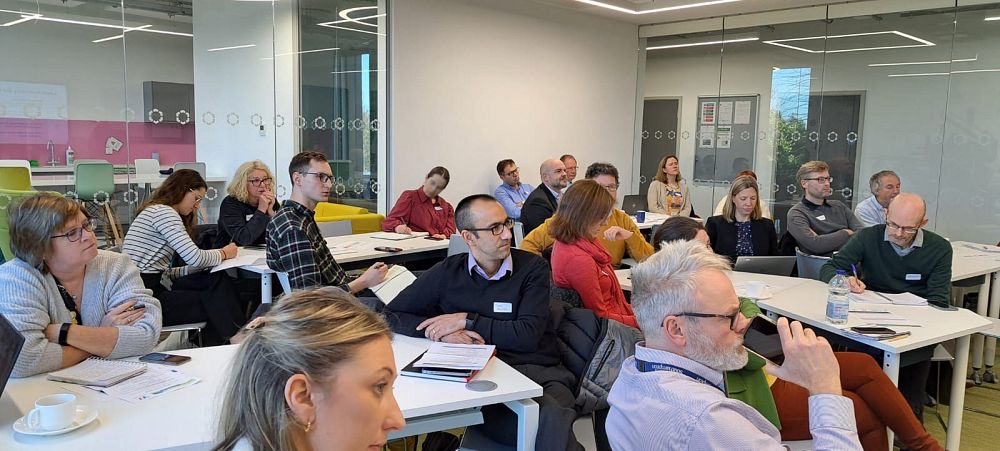Colleagues from across Wessex in academia, health and local authorities with expertise and interest in air quality came together to share knowledge and explore where research could help address challenges and improve the health of individuals and communities in Hampshire and the Isle of Wight, Dorset and wider society.
Colleagues from across Wessex in academia, health and local authorities with expertise and interest in air quality came together to share knowledge and explore where research could help address challenges and improve the health of individuals and communities in Hampshire and the Isle of Wight, Dorset and wider society.
The team met in a workshop at the Future Towns Innovation Hub in January, co-hosted by Wessex Health Partners (WHP) and the University of Southampton’s (UoS) Sustainability and Resilience Institute (SRI) to discuss and establish a common understanding of the health and social challenges that air quality / pollution is presenting across Wessex. Their aim was to explore potential research questions to help address these challenges, understand potential funding opportunities to do this research, and identify some of the key actions for air quality across the Wessex region.
The first part of the workshop welcomed several speakers to introduce the topic and present some of the key challenges:
Professor Stephen Holgate Professor of Immunopharmacology at University of Southampton, provided an overview of the national perspective and the role of air pollutants in driving airway inflammation and the subsequent impact on the body.
David Ingram, Head of Environmental Health at Winchester City Council, presented a summary of the policy perspective, while Sian Davies, Consultant in Public Health at Hampshire County Council, Dominique de Touze, Assistant Director of Public Health - Portsmouth City Council and Dr Robin Poole, PhD researcher and Specialist Registrar in Public Health at the University of Southampton, focused on the regional and local perspectives. Dr John Boswell, Professor at the UoS, shared insights into effective community engagement and how critically important this is to sustainable change (or impact or improvements).
The second part of the workshop saw attendees break into three groups to take forward discussions based on the drivers, pressures, state, impact and response model of intervention (DPSIR) framework. The groups focused on the key emerging challenges and possible research questions in the following areas: drivers and pressures (biophysical and modelling), states and impacts (socio-economic) and response (policy).
Subsequently, the group reconvened to reflect on their discussions and consider the effects of poor air quality from a local public health perspective as well as how health, social, economic and cultural factors directly impact health inequalities.
The workshop was hugely successful in bringing together a wide range of expertise across Wessex to establish the implications of poor air quality for our population, reflect on some of the key challenges across our region and nationally, and discuss ways to collaborate on research, innovation and education to tackle and reduce health inequalities in our region together.
Christine McGrath, Managing Director of WHP, said: "The workshop went very well, and we had a wide range of stakeholders. It is clear that this is a priority for those different stakeholders and that we have significant expertise with many already working on these challenges. There is clearly an appetite to accelerate the work and collaboration across our strategic alliance and with wider stakeholders this will be enabled. I can see a number of programmes arising from the day and new connections are already forming."
Professor Craig Hutton, SRI Collaboration Director, added: "We were very pleased with the outcome of our joint meeting on air quality in the region. A well-attended first meeting has provided a solid foundation from which to develop, deliver and sustain a coherent expert input to policy makers concerned with both indoor and outdoor air pollution in the Wessex region. A key feature was the diversity and quality of presentations grounded in policy, health, social context and data that were then supported by a clear guide to the funding landscape in this area. A series of round tables identified key research topics for development and critically establish a strong focus on the social, economic, poverty, governance and health implications of deteriorating air quality. SRI looks forward to a productive working relationship with this group in partnership with WHP. "
Jon Lawn, SRI Collaboration Manager, summarised the event as: "We were delighted with the breadth and depth of engagement from everyone at the workshop, and the willingness of the collective to address the challenges. It was enlightening to hear views from different sectors and disciplines, which highlighted how we need to ensure we are working together and thinking about the whole system - from the scientific data on the source of air pollution through to the behavioural change needed to ensure application of policy is successful."
Moving forward, the air quality network will continue to meet, expanding its diversity of collaborators, working together on funding applications, research programmes and real-world impact.
-
The second part of the workshop saw attendees break into three groups to take forward discussions based on the drivers, pressures, state, impact and response model of intervention (DPSIR) framework.
-
The second part of the workshop saw attendees break into three groups to take forward discussions based on the drivers, pressures, state, impact and response model of intervention (DPSIR) framework.
-
The second part of the workshop saw attendees break into three groups to take forward discussions based on the drivers, pressures, state, impact and response model of intervention (DPSIR) framework.
-
The second part of the workshop saw attendees break into three groups to take forward discussions based on the drivers, pressures, state, impact and response model of intervention (DPSIR) framework.

